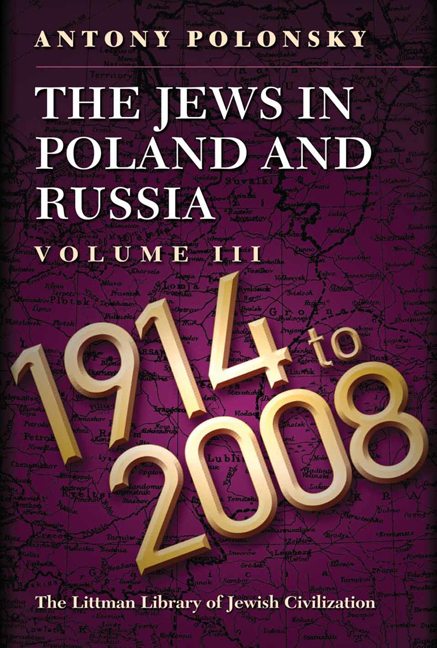Book contents
- Frontmatter
- Dedication
- Acknowledgements
- Contents
- List of Maps
- List of Tables
- Note on Transliteration
- Note on Place Names
- Maps
- General Introduction
- PART I FROM THE FIRST WORLD WAR TO THE SECOND
- PART II WAR AND GENOCIDE, 1939–1944
- PART III FROM THE END OF THE SECOND WORLD WAR TO THE COLLAPSE OF THE COMMUNIST SYSTEM
- EPILOGUE JEWS IN EASTERN EUROPE AND RUSSIA SINCE THE END OF COMMUNISM
- Conclusion
- Glossary
- Bibliography
- Index
17 - The Last Years of Communism, 1968–1991
- Frontmatter
- Dedication
- Acknowledgements
- Contents
- List of Maps
- List of Tables
- Note on Transliteration
- Note on Place Names
- Maps
- General Introduction
- PART I FROM THE FIRST WORLD WAR TO THE SECOND
- PART II WAR AND GENOCIDE, 1939–1944
- PART III FROM THE END OF THE SECOND WORLD WAR TO THE COLLAPSE OF THE COMMUNIST SYSTEM
- EPILOGUE JEWS IN EASTERN EUROPE AND RUSSIA SINCE THE END OF COMMUNISM
- Conclusion
- Glossary
- Bibliography
- Index
Summary
Some traces will remain. Photographs, printed pages, remnants of graves have survived. The number of people with personal recollections about Polish Jews will diminish. But the past will remain. I don't mean the time that is gone, I mean the world that has ceased to be. Dead worlds like this do not end; eternity rests upon them. Three million people have lived in these towns along with the Poles, and three million people went up in smoke. For seven hundred years, maybe more. Here they said their prayers, lit their candles, roasted their geese, and baked their bread, here they traded, produced children and read books. For seven hundred years.
KAZIMIERZ BRANDYS, Diary, 1982–4Silver doesn't rust. But we know that it grows dull with time. Yet if you put your hand to it—to silver or to time—and apply the necessary force, the dark layer comes off. The chain will start to shine, absorbing the light of the present day. Such is the meaning of memory: it frees the past from its darkness and permits it to shine under the sun of eternity.
FELIKS ROZINER, The Silver Chain, 1984THE SOVIET UNION FROM THE INVASION OF CZECHOSLOVAKIA TO THE COLLAPSE OF COMMUNISM
CONTRARY to what might have been expected, the invasion of Czechoslo - vakia by the countries of the Warsaw Pact did not long disrupt the improvement of relations between the Soviet bloc and the West. The Soviets seem to have been convinced that West Germany was at least in part behind the unrest in Czechoslovakia. When, after its election in 1969, the new West German government of Willi Brandt made a series of conciliatory gestures, accepting the Oder–Neisse frontier and greatly increasing its economic contacts with the German Democratic Republic, Leonid Brezhnev responded enthusiastically. He may have hoped that improved relations with the West would strengthen him in dealing with the worsening situation on the Sino-Soviet border, which led in March 1969 to armed conflict along the River Ussuri. In addition, he saw closer economic ties with the West as a way of raising the standard of living of the Soviet Union and eastern Europe without embarking on radical economic or political change.
- Type
- Chapter
- Information
- The Jews in Poland and RussiaVolume III: 1914 to 2008, pp. 708 - 760Publisher: Liverpool University PressPrint publication year: 2012

